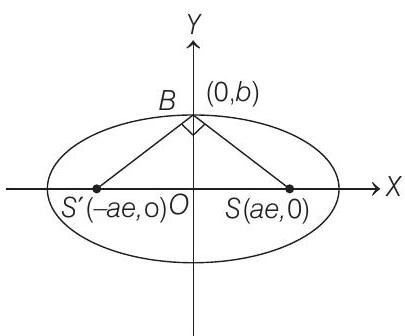Ellipse 1 Question 3
3. Let
(a)
(b)
(c) 2
(d) 4
(2019 Main, 12 Jan II)
Show Answer
Answer:
Correct Answer: 3. (d)
Solution:
- Let the ellipse be
Then, according to given information, we have the following figure.

Clearly, slope of line
Also, it is given that area of
[from Eq. (i)]
From Eqs. (i) and (iii), we get
Now, length of latus rectum
4 Let the equation of ellipse be
Then, according the problem, we have
length of minor axis
Also, we know that
From Eqs. (i) and (ii), we get
Now,
Now, check all the options.
Only






